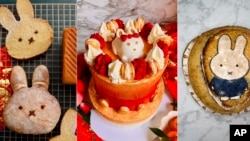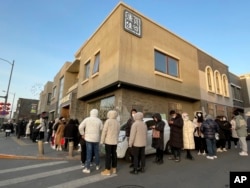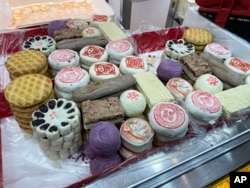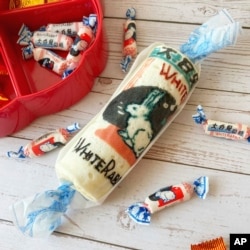Asian families from the United States to China and Vietnam celebrate the Lunar New Year on Sunday, January 22.
There are new clothes, big meals, and the traditional red envelopes of money for children. The red signifies good luck. There are also plenty of tasty, sweet desserts to have with tea throughout the day.
In China
In Beijing, China, people have been lining up outside Daoxiangcun, one of the city’s best-known bakeries, for New Year dessert gifts. Some of the treats are shaped like a rabbit, the Chinese zodiac animal of honor for 2023.
In central China’s Shanxi province, Lexi Li waited for seven hours in the cold weather to buy baked goods. Li told the Associated Press, “I don’t really like desserts and pastries, but I just want to bring something home as a gift.”
Lunar New Year desserts in China are usually based in rice or flour. They include rice balls, sesame balls, almond cookies, candied lotus seeds and steamed cakes called fat goh.
The most popular dessert is nian gao, made from rice flour along with taro, date fruit, jujube and red bean paste. Nian gao sounds like “higher year” in Chinese, meaning a more successful year ahead. It also expresses wishes for children to grow taller.
Siu Yan Ho is a Hong Kong-based expert in Chinese food culture. Siu said, “Food is memory, and this memory is connected with festivals.”
In Vietnam
Vietnam is celebrating the Year of the Cat. The traditional sweets for such celebration differ by area. Vietnamese people eat nian gao, which they call banh to. They also eat che kho gao nep, a pudding made with sticky rice and a mixture of water, ginger and either sugar or molasses. Other treats include che kho dau xanh — a bean pudding made with coconut milk and sugar — and banh tet chuoi, a rice cake with bananas.
“On Lunar New Year, for three days you go visit family, friends and teachers,” said Linh Trinh, a Vietnamese food historian studying at the University of Michigan. “So everybody has to store a lot of snacks in their house for people to come visit and have tea. It becomes like the pride of the household to serve their traditional snacks.”
In the United States
Kat Lieu, who is half Chinese and half Vietnamese, now lives in Seattle, Washington. She remembers that her mother would make steamed nian gao for breakfast every Lunar New Year. Lieu plans to do the same this year for her nine-year-old son.
“I’m also going to make the steamed nian gao and things like that, and try to have him appreciate it more, too,” she said.
Kelson Herman lives in San Francisco, California. She made bread for the Lunar New Year. She topped the bread with an image of a Miffy, a famous rabbit from a Dutch children’s book.
In Queens, New York, Karen Chin made a two-level cake frosted in coconut buttercream topped with a white chocolate rabbit. “I told my grandma that I was going to make a cake. And she’s like, ‘Don’t make it too complicated,’” Chin said, smiling.
American companies are also getting into the Lunar New Year spirit. Cupcake company Sprinkles is selling red velvet cupcakes with an almond cookie crust and almond cream cheese frosting. And, at Disney California Adventure Park, guests can order milk tea cheesecake with taro mousse.
I’m Ashley Thompson.
Terry Tang wrote this story for the Associated Press. Hai Do adapted the story for Learning English.
____________________________________________________________________
Words in This Story
envelope - n. an enclosing cover for letter, card or money
dessert - n. sweet food usually eaten after a meal
bakery - n. place where bread, cake or cookies are made
zodiac - n. time cycle divided into 12 parts for Lunar New Year calendar
festival - n. special time when people get together to celebrate
snack - n. small amount of food eaten between meals
appreciate - v. to understand the importance of something
complicated - adj. having many parts












Forum